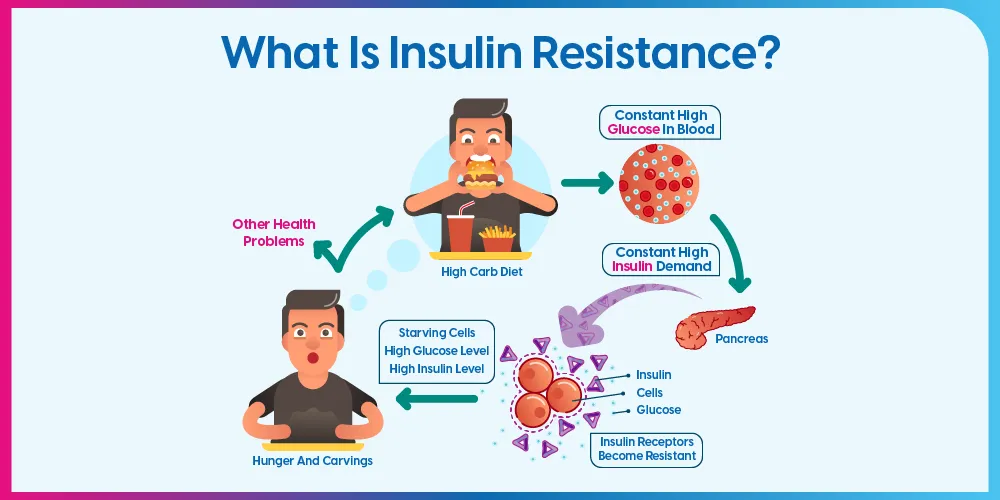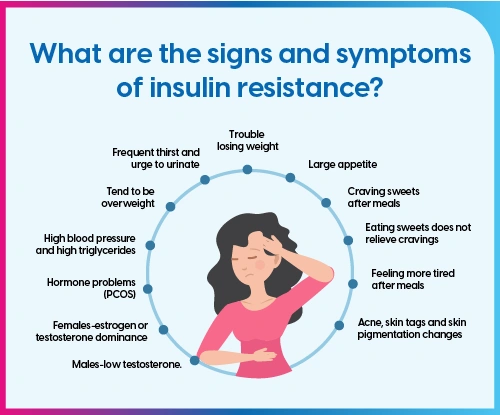What Is Insulin Resistance? Causes, Symptoms, and Solutions

These little-known facts about insulin resistance could be the key to fighting diabetes.
Don’t we always wish we could find that one thing that could fix most of our problems in life?
Insulin resistance is one such example. Working on decreasing your insulin resistance could help you lose weight and keep it off, fight prediabetes, prevent or manage diabetes, and reduce high blood pressure and cholesterol. Pretty interesting, isn’t it?
What is Insulin Resistance?
Your body breaks down whatever you eat into sugar. This sugar needs to enter your cells to provide you with energy.
Now, insulin is like a key that helps the sugar get into your cells to do what it is supposed to.
Imagine a scenario where you have lost the key or you have the wrong key. Then the glucose can’t enter the cells.
So, now you have a lot of insulin that isn’t functioning well. It is known as insulin resistance.
Ideally, the key would turn the lock, and then glucose would enter the cells. Lowering the blood sugar levels.
What are the Signs and Symptoms of Insulin Resistance?
Insulin resistance has an impact on many aspects of your health – such as obesity, cardiovascular disease, non-alcoholic fatty liver disease, metabolic syndrome, and PCOS. It is also referred to as a silent risk as it doesn’t have many non-clinical symptoms.
Therefore, the best way to detect if you have insulin resistance is to get regular health checkups.

Here are a few insulin resistance symptoms and signs that can tell you if you have insulin resistance:
-
-
- A waistline of over 40 inches in men and 35 inches in women
- Blood pressure higher than 130/80 or higher
- A fasting glucose level over 100 mg/dL
- A fasting triglyceride level of over 150 mg/dL
- A HDL cholesterol level under 40 mg/dL in men and 50 mg/dL in women
- Skin tags and patches of dark, velvety skin known as acanthosis nigricans
- Irregular menstrual cycle
-
What Causes Insulin Resistance?
Insulin resistance can be genetic. However, there are also acquired causes of insulin resistance. Let’s learn more about them:
1. Excess body fat
Research shows that obesity, particularly excess fat around your waist and organs, is also known as visceral fat. As mentioned above, a waistline of 40 inches in men and 35 inches in women.
Visceral fat increases inflammation in your body, which can contribute to insulin resistance.
2. Physical inactivity
Physical activity increases your insulin sensitivity and helps you build, which helps absorb glucose from your blood. And keep your blood sugar levels in check.
However, a lack of physical activity can have the opposite effect. Leading a sedentary lifestyle with no to little physical activity can lead to obesity, which can increase insulin resistance.
3. Diet
Highly processed diets that have a high amount of carbohydrates and saturated fats get digested very quickly by your body and spike your blood sugar levels. Increased blood sugar levels over a long span of time can increase insulin resistance.
By putting pressure on your pancreas to produce a lot of insulin.
4. Medicines
Certain medications, such as steroids and certain hypertension and psychiatric disorders, can lead to insulin resistance.
5. Medical conditions
Certain medical conditions – hormonal and genetic can increase insulin resistance.
To know your chances of Diabetes reversal, take the Diabetes Reversal TestDiabetes Reversal
Calculator
Complications of Insulin Resistance
If insulin resistance is not managed on time, it can lead to severe complications. Insulin resistance can raise insulin production so your body can maintain normal blood sugar levels.
Higher insulin levels can lead to high cholesterol, hypertension, vascular complications, and hardened arteries. It can also lead to an increased risk of stroke, cardiovascular disease, and type 2 diabetes.
What Can You Do About It?
There is no overnight solution to insulin resistance. It involves making consistent and sustainable lifestyle changes.
- Physical activity, especially weight training, can help build muscle and make you more sensitive to insulin.
- This is connected with the next solution, which is weight loss. As we know, being overweight, especially those with a high waist circumference, are more likely to develop insulin resistance.
- Losing even 5% of body weight can reduce your health risks from insulin resistance.
- Having a healthy and balanced diet, good quality and adequate sleep, and stress management also help in mitigating insulin resistance.
- A comprehensive weight management plan that takes into account more than the traditional aspect of weight loss is the best way to tackle insulin resistance.
Fitterfly’s plans for stubborn weight loss, prediabetes, and type 2 diabetes are designed to manage all these aspects. Along with three dedicated coaches to guide you through your journey.
How is Insulin Resistance Diagnosed?
There is no singular test to diagnose insulin resistance. There are, however, tests that are associated with signs of insulin test, which can give a full picture to your doctor about whether you have insulin resistance.
You can test for fasting blood glucose, HbA1c, and a lipid panel test. If you have health complications, your doctor may even order related tests such as metabolic syndrome, cardiovascular disease, or PCOS.
How Should You Change Your Food Habits To Beat Insulin Resistance?
Yes. This is key.
To start with, avoid highly processed foods that are high in carbohydrates, saturated fats, and sugar. It is important to have a diet that is balanced and, most importantly, rich in fiber and protein to promote satiety.
But wait, don’t google the best diet for insulin resistance management. A generic plan will not help and, most importantly, not be sustainable.
Fitterfly’s programs conduct a thorough assessment of your nutrition and your blood sugar levels using blood sugar level logs, track your glycemic response to various foods that you eat with the help of a CGM sensor, a detailed consult call, and use this information to understand your personalized glycemic response to create a personalized diet plan with food pairings that don’t cause sudden spikes or dips in your blood sugar levels.
Best Exercise For Insulin Resistance
Both aerobic and weight training exercises can help improve your insulin sensitivity and help reduce insulin resistance and related complications.
Building muscles has been shown to significantly help reduce insulin resistance, as excess glucose from blood gets absorbed by your muscles.
However, it is important to have an expert guide you to ensure you eliminate the risk of injury.
Fitterly’s programs include a detailed fitness assessment test to make sure you start at a level that will not lead to any pain or discomfort. It also includes pain management therapy to take care of existing pain. Especially if you have joint or heel pain.
REVERSED Diabetes in 3 months


5.7%
Happy members
EMI
Guarantee
4.8/5
Diabetes Prime Program
How Stress And Lack Of Restful Sleep Can Worsen Insulin Resistance?
Stress and sleep can reduce insulin sensitivity. Sleep deprivation and poor quality sleep can impact cortisol and insulin levels and can, therefore, increase your blood glucose levels.
Not getting enough sleep can also increase inflammation in your body, which can also reduce insulin sensitivity.
Increased stress can trigger the release of hormones such as adrenaline and cortisol. However, these make it difficult for insulin to function properly, contributing to insulin resistance.
This is why you have access to a fitter mind coach for stress and sleep management and habit formation for being able to sustain these lifestyle changes for a long time.
Is There A Medicine For Insulin Resistance in India?
No. There are no medicines for treating insulin resistance. However, certain medicines prescribed for diabetes can reduce insulin resistance. The best way to reduce insulin resistance is by making lifestyle changes that tackle the root causes.
Can I Get Professional Help To Reduce Insulin Resistance?
Yes. You can speak with your healthcare provider or your diabetes management care team to help you personalize your diabetes care plan or your weight loss plan to help reduce insulin resistance. However, since insulin resistance is a combination of multiple factors, it is important to work to tackle them all.
Fittertake
Fitterfly’s Diabetes Care Program is highly personalized based on validated and scientific scientific data points and detailed assessment of nutrition, physical, and mental health.
Not only that, but you are also provided with an expert three-coach team, i.e., dietician, physiotherapist, and psychologist, to help guide you throughout the journey, track your progress, improvise based on your progress, and provide a support system.
Our programs are clinically validated and outcome-oriented.
We suggest you also speak to our diabetes healthcare team to understand the consumption of protein powders and shakes in the diabetes diet and much more.
To learn more about Fitterfly’s Diabetes Care Program and how it can help you intelligently take control of your diabetes, speak to one of our counselors by just giving us a missed call at 08068507599, and we will definitely get back to you.
This blog provides general information for educational and informational purposes only and shouldn't be seen as professional advice.
Frequently Asked Questions
Can insulin resistance be reversed?
Yes, insulin resistance can often be improved and sometimes even reversed by making healthy lifestyle changes like eating balanced meals and being active.
Can insulin resistance be cured?
While it can be managed well, there isn't a sure cure for insulin resistance. But if diagnosed early with a healthy lifestyle habits it can go into remission.
Can you measure insulin resistance?
Yes, healthcare providers diagnose insulin resistance with the help of certain signs (acanthosis nigricans) through blood tests that check your blood sugar levels, serum insulin and how your body responds to sugar.
Can insulin resistance be treated?
Yes, it can be controlled by following lifestyle changes in terms of healthy diet, exercise & weight loss, sleep & stress management and with proper medications.
How can you find out if you have insulin resistance?
Yes, you can diagnose insulin resistance with the help of certain sign and symptoms (Acanthosis nigricans - Hyperpigmentation) and with blood tests like blood sugars and serum insulin levels.
Is insulin resistance the same as diabetes?
Insulin resistance is linked to diabetes, but they're not the same. Insulin resistance can lead to type 2 diabetes or Pre diabetes if not managed.
Does insulin resistance cause weight gain?
Yes, sometimes insulin resistance can make it easier to gain weight, but it's not the only reason for weight gain.
Does insulin resistance cause PCOS?
Yes, insulin resistance can be connected to polycystic ovary syndrome (PCOS) in some cases in females.
Does insulin resistance cause hair loss?
Hair loss can be related to insulin resistance, but other factors can also contribute to hair loss.
Which foods cause insulin resistance?
Foods high in sugar, unhealthy fats such as processed and fried food can contribute to insulin resistance. Eating a healthy diet rich in fiber such as fruits, vegetables, and whole grains can help prevent it.
Which foods reduce insulin resistance?
Foods like whole grains, lean proteins, fruits, and vegetables can help improve insulin resistance.
How long does insulin resistance last?
It varies, but with healthy lifestyle changes, insulin resistance can get better over time.
How is insulin resistance diagnosed?
Doctors use blood tests and sometimes other health information to diagnose insulin resistance.
How is the insulin resistance test done?
Commonly there are no specific tests done to diagnose insulin resistance , However your healthcare provider may ask for tests such as fasting plasma glucose test, OGTT, HbA1c and serum insulin levels or HOMA-IR.























